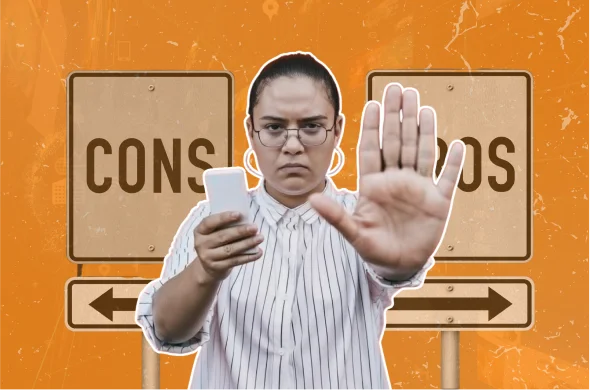The impact of social media on the way we express ourselves is truly astonishing, and we’re not even limited to one platform. From Facebook to Instagram to Twitter and YouTube, these platforms have different features that allow us to share our ideas and opinions and form online communities.
In a nutshell, social media is an avenue for free speech. However, as more people join the conversation, the clash of ideals and principles leads to debates and arguments. While necessary in discourse, an increasing number of people are spreading hoaxes and propaganda, resulting in polarizing opinions and heated discussions.
As a solution, censorship has been widely implemented to reduce production and consumption of harmful and extremist content. However, there are always two sides to every coin, and censorship is not an exception.
In this blog, we’ll discuss the pros and cons of censorship to better understand its impact on social media platforms.
The Importance of Free Speech on Social Media
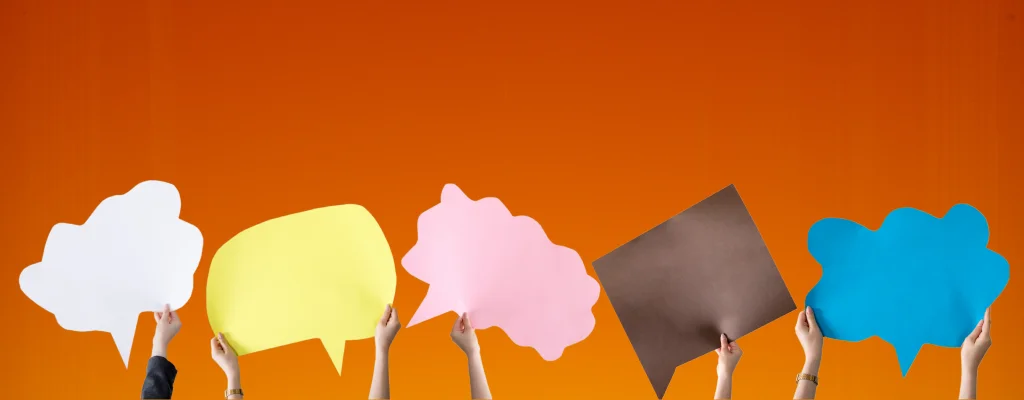
In democratic societies, free speech is a constitutional right. Meaning, each individual can express oneself in a way that doesn’t take away other people’s rights. Ideally, the free exchange of ideas, information, and opinions should provide the knowledge to make better societal decisions.
Since democracy cannot exist without free speech, it’s essential to be vigilant about the actions that could potentially disrupt it. While it directly involves social media interactions, possible threats to free speech may also include inconsistent content moderation. But before we delve deeper into this, we must first take on the merits of free speech on social media:
Promoting Diverse Viewpoints
Promoting free speech on social media can create an inclusive community where diverse viewpoints can be heard, accommodating social media users who come from different cultures and backgrounds.
When people are more open to the perspective of others, they can be more empathetic and accepting of their differences. This can lead to more meaningful conversations that could be for a good cause or advocacy.
Encouraging Public Debate
Social media can encourage public debate. Engaging in debates sharpens our ability to think critically, communicate respectfully despite polarizing viewpoints, form camaraderie with like-minded peers, and engage in healthy competition.
Empowering Marginalized Voices
Social media provides a platform for everyone who wants to speak their mind, especially marginalized voices. These include women, people of color, members of the LGBTQ+, persons with disabilities, indigenous groups, and those of a lower socio-economic status.
Throughout history, these folks have been oppressed by influential nations and discriminatory groups that spur racism, homophobia, sexism, and microaggressions. With social media, they can call out all forms of discrimination and violence against them.
Cultivating Creativity
Another benefit of free speech on social media is the promotion of creativity. Users are free to express themselves by publishing blogs, images, and videos that reflect their personalities and ideals. By encouraging creativity, innovative ideas can be born, and artistic collaborations can flourish.
In recent times, short-form content has become increasingly popular on social media with the onset of TikTok. Through this format, users have unlocked their limitless potential to craft creative content that lasts anywhere from 15 to 30 seconds.
Pros: The Case for Censorship
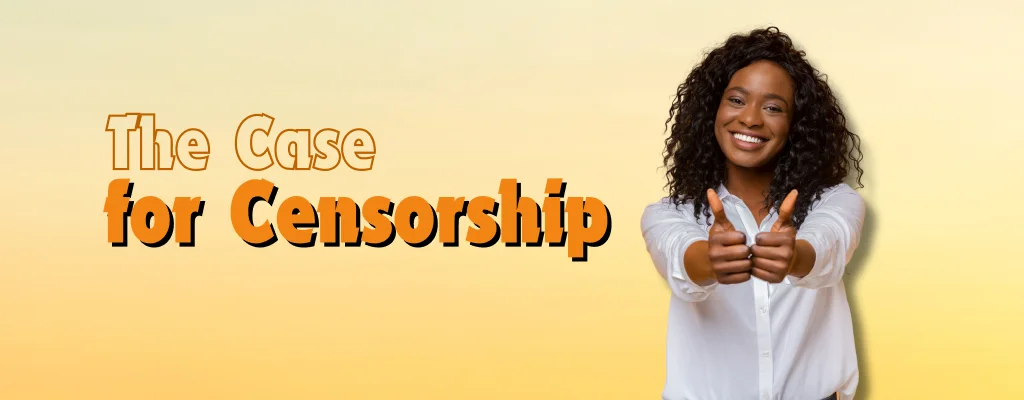
Internet censorship refers to restricting the content viewed or published by an audience within a particular region. For example, several websites and apps are banned in China, including social media giants like Facebook, Instagram, and Twitter.
In this case, the state or institution can restrict access to particularly unsafe or sensitive information or online material. Censorship may come in the following forms:
- Blocking or filtering certain websites
- Monitoring online activities of users
- Limiting access to online platforms or services
- Suppressing specific types of content
Organizations believe that by implementing this regulation, the general interest and welfare of their social media users can be safeguarded.
Some of the common benefits of censorship include:
Protecting Users from Harmful Content
One of the main pros of censorship is that it protects users from harmful content they may view while scrolling on their favorite social media app. In particular, content like graphic violence and pornography should be banned on apps to prevent minors from mimicking such acts. Censorship of profanity and offensive language can also help avoid online misconduct, such as hate speech and cyberbullying.
Additionally, it helps combat the ongoing struggle of misinformation. For the younger generation, social media is the most common news source, with Facebook, Twitter, and TikTok becoming the new daily newspapers. However, it was found that fake news can spread ten times faster on these platforms. Censoring false information on social media is necessary to prevent them from circulating and distorting online safety.
Maintaining a Safe Space Online
By censoring inappropriate content and controlling toxic online behavior on social media, users can interact with others without the fear of getting bullied or harassed or running into distressing forms of content.
By putting a limit to what type of material can be shared on social media, people can be more mindful of what they post and how they communicate with fellow users.
Preventing the Spread of Illegal Activities
Illegal content like drugs, weapons, and gambling spread like a wildfire. To restrict access to illicit websites and pages promoting these, certain regions may censor these platforms.
By doing so, social media users won’t fall prey to these illegal activities, and it will also help platforms avoid lawsuits that may result from these unwanted actions.
Cons: The Case Against Censorship
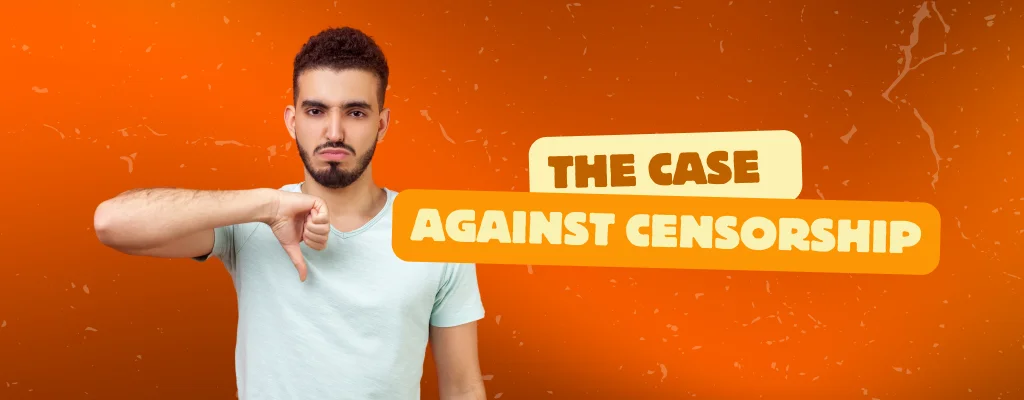
Despite the arguments in favor of censorship, it raises some concerns about stifling freedom of speech and the possible abuse of this power.
Here are some of the potential downsides and dangers of censorship:
Risk of Suppressing Speech and Opinions
One of the primary criticisms in censorship is the possibility of hindering the right of an individual to free speech. When certain topics are censored, it can limit the flow of open dialogue and impede the democratic exchange of dissenting ideas and opinions. Consequently, this can create echo chambers that only tolerate certain perspectives, narrowing the space for constructive arguments.
Moreover, censorship can also limit conversations on social media platforms because people can have different definitions of harmful or unacceptable content. What might be deemed offensive to some may not be disrespectful to others. This can be potentially dangerous to social media, where people come from various cultures and geographic locations.
Potential Abuse of Censorship
Another problem that arises in censorship is the possibility of abuse to silence the opposition, limit access to information, or manipulate narratives to spread propaganda. It can be used to distort the truth and control the people’s perception regarding a political party or historical events. This manipulation of information can influence and shape people’s beliefs to favor a particular agenda.
As a result, opposing opinions can be instantly shunned, creating an online environment where misinformation thrives.
Impact on Democratic Values
Due to the risk of suppressing speech and opinions, censorship can profoundly impact freedom of expression and democratic values. It can result in ethical dilemmas, such as determining which values or ideologies are acceptable or not.
These subjective biases can also influence what information the public can access and discuss within online communities. When information is suppressed, the narrative that the masses consume is also compromised.
Balancing Free Speech and Censorship
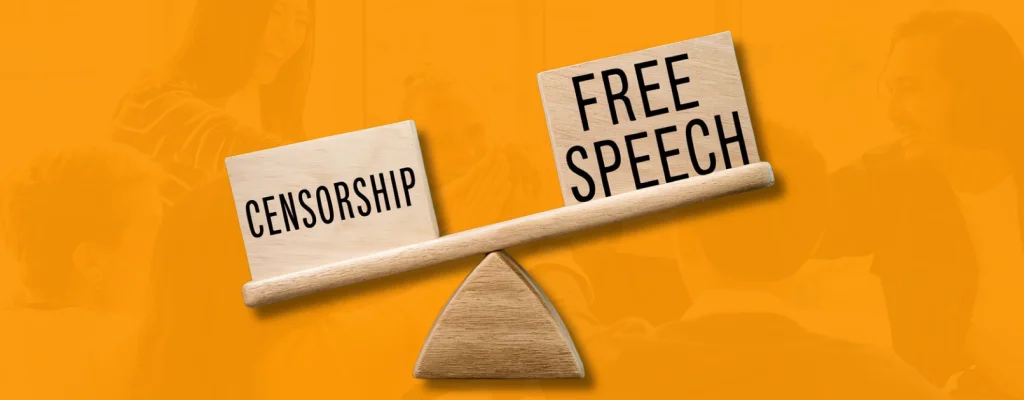
With the pros and cons of censorship laid out, it’s essential for social media companies to balance free speech with the need for censorship.
The first step is investing in effective social media moderation services to enforce strict regulations and review all types of UGC, including status updates, comments, images, reels, and videos that may contain harmful content.
By utilizing content moderation tools, social media moderators can filter keywords and visual content that may not be appropriate for the platform’s audience. These can include profanity, sarcasm, offensive language, nudity, violence, and other inappropriate material.
Some content moderation companies also use artificial intelligence to automate the moderation process. They train algorithms under large datasets to quickly identify toxic content before it is published on the platform. They also allow users to have a proactive role in social media moderation by incorporating user reporting mechanisms to flag non-compliant posts or fake profiles and accounts showing suspicious behavior.
Real-World Examples and Case Studies

There are dozens of accounts of censorship on social media. While controversial, these real-world examples provide a glimpse into the impact of this practice and its complexities.
Twitter Banning Donald Trump
In January 2021, Twitter permanently suspended the account of then-president Donald Trump due to the Capitol Riots that may further incite violence on the platform. This decision sparked intense debate over free speech versus public safety, which some critics cited as political censorship.
Facebook and Cambridge Analytica
In 2018, Facebook faced a huge backlash following the Cambridge Analytica controversy, which led to an insurmountable amount of data being harvested without the users’ consent. This incident has led to tighter scrutiny and censorship of political content, with users and regulators demanding more transparency and accountability due to privacy concerns.
YouTube and COVID-19 Misinformation
During the pandemic, YouTube was forced to implement stricter content moderation efforts due to the rapid spread of false information about the virus and the vaccines being given. The videos were subsequently removed but opposing groups viewed it as suppression of dissenting opinions and scientific debate. Supporters, however, saw it as a necessary move for public health.
China’s TikTok Censorship
In 2020, the United States government threatened to ban TikTok, a Chinese-owned social media app, due to concerns over national security and misuse of information. This issue underscored the geopolitical tensions between these two powerful nations and the balance between digital sovereignty and global internet freedom.
The Future of Social Media Free Speech and Censorship

The future of social media moderation is poised to be heavily influenced by emerging technologies like AI and machine learning. Advanced algorithms will enable faster and more accurate detection of harmful content.
Policy changes and regulatory frameworks will also play a crucial role in shaping approaches to censorship on social media. Governments worldwide are likely to implement stricter regulations to curb misinformation and the spread of harmful content while protecting user rights.
Meanwhile, independent bodies could be created to oversee the moderation process and ensure fair judgments. They may impose fines for non-compliance and require mandatory reports from social media platforms.
Chekkee: Perfect Partner to Tailor Perfect Social Media Moderation Solutions
The pros and cons of censorship on social media highlight the perpetual challenge of content moderation in the online world. More so, as AI technology evolves, it's crucial to assess the impact of these changes. Engaging in this ongoing debate will help shape a digital landscape that respects both freedom of expression and user safety.
With the social media moderation services offered by Chekkee, your social media platform can ensure a fair and transparent online environment. Chekkee leverages both human and AI capabilities to ensure that your content moderation practices are up-to-date, striking a balance between user safety and freedom of speech.Put censorship to good and fair use. Contact us today!
